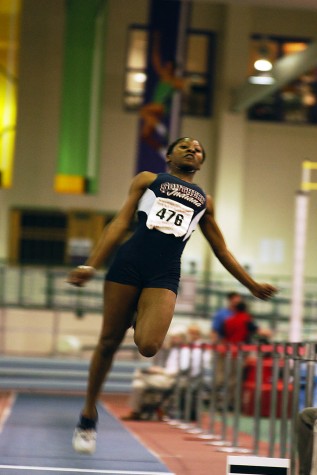Fairer jumps back into action at USI

Candace Perry Fairer completes a long jump attempt during a meet in 2005. Fairer is one of the six inductees into this year’s athletic hall of fame.
Candace Perry Fairer thought her life was over when she couldn’t compete athletically her freshman year of college.
“I had interest letters from every school in the country,” Fairer said. “My grades were not where they needed to be and my test scores were not where they needed to be.”
If not for her grades Fairer could have attended any university in the U.S.
At the end of her high school career, she was jumping more than 19 feet in the long jump.
Fairer found herself at USI as a result of her low grades and test scores, but she was ready to work.
As a first generation college student, she was determined to utilize the opportunities she was given and find her way onto the track and field team.
Now, 10 years after she left the university, she’s back on campus as an admissions counselor and will soon be inducted into the USI Athletic Hall of Fame.
When Fairer returned in August, she did it without alerting anyone in the Athletic Department. She said she walked over randomly one day to visit Mike Hillyard, the men’s and women’s track and field head coach, when she found out she was eligible for the hall of fame.
Fairer said it wasn’t until Assistant Athletic Director Mandi Fulton told her she planned to nominate her that she even realized it was a possibility.
Without knowing the process, Fairer said she still couldn’t be sure she would be inducted, but when she found out she was, she was excited because it connects to her return to the university.
“My whole point in coming back was to be here and to be a part of USI,” Fairer said. “I’m also working on the diversity team here as well. It shows students that they can come here, do well and be successful.”
Fairer said during a time when the university is working to build recruitment and retention of minority students, she’s glad her face can be an example of what can be accomplished here.
“I was not the best student, and I had no pioneer to tell me, ‘Hey, you need to make sure you’re focused on these grades in high school because they won’t allow you to be mediocre in the classroom at college,’” Fairer said. “Now that is one thing I stress to student athletes. Your athletic ability will not get you there alone.”
When she first entered the university, she was not eligible to compete under NCAA regulations. Hillyard said Fairer approached him during Welcome Week and explained her situation to him.
Hillyard said despite her not being able to train with them from the start, she was a great athlete.
“Coach Hillyard is one of a kind,” Fairer said.
Hillyard is not a jumps coach and he was upfront with Fairer about that.
“We’ve always been a distance program,” Hillyard said. “Without scholarships in the jumps and sprints, we don’t actively recruit in that area.”
Fairer said it didn’t matter that Hillyard wasn’t trained to coach her fully because he always found someone who could.
“He cared enough to try, and he cared enough to keep pushing me, and he cared enough to wake up in the wee hours of the morning to take me to meets to make sure I could make the national records,” Fairer said. “I really appreciate all that he did. When he didn’t know what to do, he contacted the people he knew could help me.”
After she became the first women’s track and field student athlete to win a NCAA Division II Outdoor national championship in a field event, she and Hillyard decided to weigh her options.
They agreed she needed to go to a school with a program and a coach who specialized in jumps.
“I knew we were very limited with what we could do,” Hillyard said. “We didn’t have a jumps coach. We didn’t have the facilities. (I knew) given the opportunity, she might be able to do some bigger things in the future.”
After this, Fairer approached Indiana University and transferred on a full scholarship for her final two years of college.
“IU pushed me along athletically,” Fairer said. “They showed me a world I never knew, never thought possible, and from that experience, it gave me my career.”
After college, Fairer had the opportunity to coach both college and professional athletes, including almost two years at Auburn University.
She made the decision to stop coaching after she found the travel and time commitments too strenuous for her as a mom.
Now, despite never in “one million years” believing she would return to Evansville, she returned to a job in admissions with her two-year-old Rory.
“USI gave me the life back that I thought I lost because of not being able to play college athletics as a college freshman,” Fairer said. “I’m forever grateful for being able to get here and for the help (Hillyard) gave me and pushed me along with because I had given up.”


